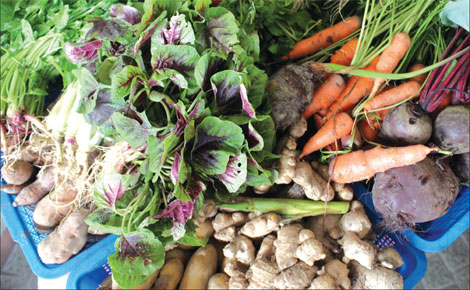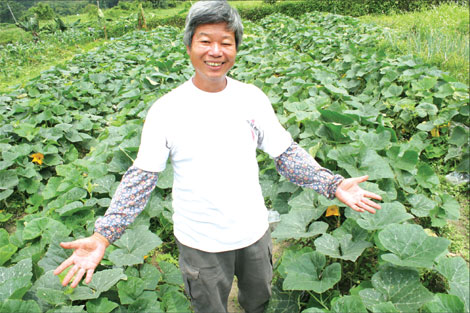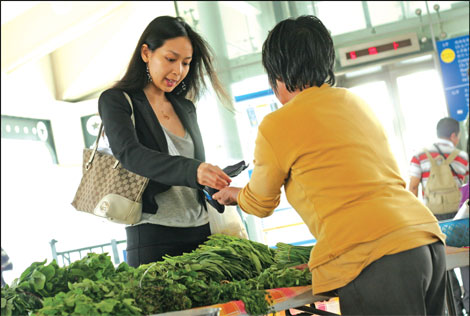Organic lifeline
Updated: 2010-05-20 07:12
By Doug Meigs(HK Edition)
|
|||||||||
|
Some of the fresh organic vegetables farmers sell at local markets. Provided to China Daily |
The big-idea, small-scale efforts of local farmers and farmers' markets to save the planet, our health and some cash, although labor intensive, are labors of love. Doug Meigs reports.
Every weekend, the Kwok family rises early to harvest organic fruit and vegetables for farmers' markets. When dawn peeks over the mountains of northern New Territories, they are busy in the fields.
Kwok Tung-sum woke at 5 am on a Sunday to pack produce into plastic bins. His wife, daughter and one employee transported their bounty via van to the iconic Central Star Ferry Pier on Hong Kong Island.
Hong Kong has four weekly farmers' markets. The Central Pier hosts a market on Sundays from 11 am to 5 pm and Wednesdays from noon to 6 pm. A farmers' market in Tai Po runs on Sundays from 9 am to 5 pm near the KCR station. Tuen Mun has a market at Crossroads every Saturday from 10 am to 4 pm.
After Kwok's family departed for the market, Kwok resumed work on their 18,100 square meter plot nestled in a fertile valley on the edge of Pat Sin Leng Country Park.
Kwok said he grew up on a farm in Yuen Long and returned to his roots after losing his fortune in the 1997 Asian financial crisis. He farmed in Yuen Long for a few years before establishing the Hok Tau Potted Organic Vegetable Grange in 2006.
As an organic farmer, he is part of a growing trend to facilitate by farmers' markets.
Hong Kong had fewer than 20 organic farms in the late 1990s. The tally has skyrocketed to 320 organic farms by 2010, according to the Agriculture, Fisheries and Conservation Department.
However, a representative for Kadoorie Farm and Botanical Gardens doubts government estimates. Idy Wong, Head of Sustainable Living and Agriculture at Kadoorie said the figure is likely closer to 100 small-scale organic farming operations.
Her organization played a prominent role in nurturing local organic markets. Kadoorie organizes the Sunday market in Central (a separate entity - the Sustainable Ecological Ethical Development Council -manages the Wednesday market).
Kadoorie has assisted farmers in Hong Kong since 1956 and began focusing on organic agriculture in 1995,hosting Hong Kong's first organic farmers' market between 1999 and 2002.
SEED (previously known as the Hong Kong Organic Farming Association) joined forces with Kadoorie and other partners in 2006 to host a market in Wan Chai. The Wan Chai market gradually transitioned into the current Central farmers' market in 2007.
Kwok said he first sold crops at a farmers' market in late summer of 2006 and quickly built a network of buyers. Now, he sells mostly direct to his customers.
High organic food prices dissuade some would-be buyers. The extra expense stems from one primary reason: organic costs more to produce.
Refusing to use chemical fertilizers or pesticides requires farmers to work longer hours for lower crop yields. Kwok wraps plastic around his oranges to guard against insects. Regardless, he expects to lose a sizable portion of the crop to bugs.
"The value is not the price; it is the quality," he said. "You can taste the difference in real organic food. But the problem is that it takes longer to grow and that it takes a long time for people to understand the value of eating organic or to understand what is organic (and what isn't)."
Kwok emphasized that there is a difference between organic food and food that is simply "green" or healthy.
He is concerned that some corporate grocery chains import supposedly "organic" products from around the world; however, organic should be local. Eco-eagerness does not offset carbon emissions from international freight. Kwok also noted that many farmers use greenhouses and excess watering to attain heavy "super-organic" vegetables grown in unnatural settings.
However, one special unnatural setting is crucial for organic foods' sales: Hong Kong's Central Pier. Approximately 35,000-40,000 pedestrians use the Central Pier to transit between Central and Tsim Sha Tsui everyday, said Catherine Wong, a Star Ferry Co marketing officer.
The high-density foot traffic makes Central Pier an ideal location for promoting organic farming.
But, one disgruntled passerby said that although he buys organic foods,he thinks the weekly markets make Star Ferry and Hong Kong appear shameful and messy. He rushed past the vendors without visiting.
Others expressed genuine delight, their attention caught and held by copious free samples.
On the most recent Sunday market, 12 farms joined one another in a phalanx of foldout tables - ears of sweet corn, cherry tomatoes, onions, carrots and various leafy greens spilling over in giant piles.
Tourists stopped to take photos. A visiting hotel manager from the French Caribbean said the Central market changed her perception of China.
"Maybe it was the wrong idea, but I didn't expect (Hong Kong residents) would be so concerned with the environment; this is really good," said Catherine Chareau.
A well-dressed housewife in a pearl necklace haggled in Cantonese with another vendor over potatoes.
"These are really good! People keep coming back!" the man said with a heavy Hakka accent and a big smile.
"If that's true, then I'll come back next week," she replied after buying.
A Hong Kong resident from Japan, Eiichi Ito, speaking as he pushed his 2-year-old daughter in a stroller, is one of the customers returning every week. Ito said the food tastes good and cheap compared to some organic food shops in Hong Kong, although he said it's not as good as the organic food he buys in Japan.
"For me, eating non-organic is no problem; but for my baby, I want the best," he said.
The Wednesday market was notably more subdued. Six farms sold produce on May 12. Some of the same vendors sold at the Sunday markets at Central and Tai Po.
Mid-week visitors to the farmers' market tend to be housewives shopping for dinner ingredients or office workers in-transit.
Eileen Ho stopped at the market after finishing her workday in a nearby immigration law firm. "It's convenient," she said.
The Central farmers' market features a carnival on the third Sunday of every month. On May 16, there were 20 booths and numerous educational games. Cooks demonstrated how to prepare organic dumplings for the upcoming Dragon Boat Festival.
Attending all of Hong Kong's farmers' markets is not economically feasible for local farmers, including the Kwok family. The daughter works a full-time job, and the parents can't afford to ignore their crops for an entire day.
Alternative revenue sources have increasingly helped many local organic farms. The government has established a scheme to help farmers sell organic produce to wet markets and grocery stores, and many farms have turned to eco-tourism.
The first organic farm in Hong Kong is located a 10-minute walk from Kwok's farm. Produce Green established the farm in 1988 at Hok Tau Village. The non-profit foundation survives in part through memberships fees and does not sell at any farmers' markets.
Markets remain essential for Kwok's business model. This weekend, he will again scour his farm for fresh produce in the first light of morning.
Every time he plucks a pepper from the vine, he spans the gap between Hong Kong's natural earth and dinner tables entangled in a concrete jungle.
"I don't do it for the money. I love this land," he said.
|
A farmer shows off her organic vegetable plot in the New Territories. |
|
A customer pays for her purchase of fresh greens at a Sunday market on Hong Kong Island. |
(HK Edition 05/20/2010 page8)


